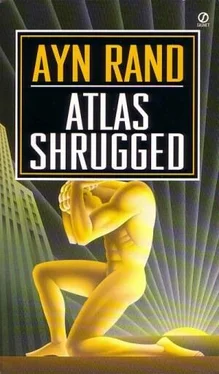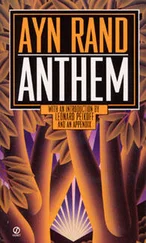"They've learned it," said Galt. "Isn't that the particular lesson you have been teaching them for twelve years?"
"I? Yes. But the semester is over. Tonight was the last act of violence that I'll ever have to perform. It was my reward for the twelve years.
My men have now started to build their homes in the valley. My ship is hidden where no one will find her, until I'm able to sell her for a much more civilized use. She'll be converted into a transatlantic passenger liner—an excellent one, even if of modest size. As for me, I will start getting ready to give a different course of lessons. I think III have to brush up on the works of our teacher's first teacher."
Rearden chuckled. "I'd like to be present at your first lecture on philosophy in a university classroom," he said. "I'd like to see how your students will be able to keep their mind on the subject and how you'll answer the sort of irrelevant questions I won't blame them for wanting to ask you."
"I will tell them that they'll find the answers in the subject."
There were not many lights on the earth below. The countryside was an empty black sheet, with a few occasional flickers in the windows of some government structures, and the trembling glow of candles in the windows of thriftless homes. Most of the rural population had long since been reduced to the life of those ages when artificial light was an exorbitant luxury, and a sunset put an end to human activity. The towns were like scattered puddles, left behind by a receding tide, still holding some precious drops of electricity, but drying out in a desert of rations, quotas, controls and power-conservation rules.
But when the place that had once been the source of the tide—New York City—rose in the distance before them, it was still extending its lights to the sky, still defying the primordial darkness, almost as if, in an ultimate effort, in a final appeal for help, it were now stretching its arms to the plane that was crossing its sky. Involuntarily, they sat up, as if at respectful attention at the deathbed of what had been greatness.
Looking down, they could see the last convulsions: the lights of the cars were darting through the streets, like animals trapped in a maze, frantically seeking an exit, the bridges were jammed with cars, the approaches to the bridges were veins of massed headlights, glittering bottlenecks stopping all motion, and the desperate screaming of sirens reached faintly to the height of the plane. The news of the continent's severed artery had now engulfed the city, men were deserting their posts, trying, in panic, to abandon New York, seeking escape where all roads were cut off and escape was no longer possible.
The plane was above the peaks of the skyscrapers when suddenly, with the abruptness of a shudder, as if the ground had parted to engulf it, the city disappeared from the face of the earth. It took them a moment to realize that the panic had reached the power stations—and that the lights of New York had gone out.
Dagny gasped. "Don't look down!" Galt ordered sharply.
She raised her eyes to his face. His face had that look of austerity with which she had always seen him meet facts.
She remembered the story Francisco had told her: "He had quit the Twentieth Century. He was living in a garret in a slum neighborhood.
He stepped to the window and pointed at the skyscrapers of the city.
He said that we had to extinguish the lights of the world, and when we would see the lights of New York go out, we would know that our job was done."
She thought of it when she saw the three of them—John Galt, Francisco d'Anconia, Ragnar Danneskjold—look silently at one another for a moment.
She glanced at Rearden; he was not looking down, he was looking ahead, as she had seen him look at an untouched countryside: with a glance appraising the possibilities of action.
When she looked at the darkness ahead, another memory rose in her mind—the moment when, circling above the Afton airport, she had seen the silver body of a plane rise like a phoenix from the darkness of the earth. She knew that now, at this hour, their plane was carrying all that was left of New York City.
She looked ahead. The earth would be as empty as the space where th6ir propeller was cutting an unobstructed path—as empty and as free.
She knew what Nat Taggart had felt at his start and why now, for the first time, she was following him in full loyalty: the confident sense of facing a void and of knowing that one has a continent to build.
She felt the whole struggle of her past rising before her and dropping away, leaving her here, on the height of this moment. She smiled—and the words in her mind, appraising and sealing the past, were the words of courage, pride and dedication, which most men had never understood, the words of a businessman's language: "Price no object."
She did not gasp and she felt no tremor when, in the darkness below, she saw a small string of lighted dots struggling slowly westward through the void, with the long, bright dash of a headlight groping to protect the safety of its way; she felt nothing, even though it was a train and she knew that it had no destination but the void.
She turned to Galt. He was watching her face, as if he had been following her thoughts. She saw the reflection of her smile in his. "It's the end," she said. "It's the beginning," he answered.
Then they lay still, leaning back in their chairs, silently looking at each other. Then their persons filled each other's awareness, as the sum and meaning of the future—but the sum included the knowledge of all that had had to be earned, before the person of another being could come to embody the value of one's existence.
New York was far behind them, when they heard Danneskjold answer a call from the radio: "Yes, he's awake. I don't think he'll sleep tonight. . . . Yes, I think he can." He turned to glance over his shoulder. "John, Dr. Akston would like to speak to you."
"What? Is he on one of those planes behind us?"
"Certainly."
Galt leaped forward to seize the microphone. "Hello, Dr. Akston," he said; the quiet, low tone of his voice was the audible image of a smile transmitted through space.
"Hello, John." The too-conscious steadiness of Hugh Akston's voice confessed at what cost
Galt chuckled and—in the tone of a student proudly presenting a completed task of homework as proof of a lesson well learned—he answered, "Of course I am all right, Professor. I had to be. A is A."
The locomotive of the eastbound Comet broke down in the middle of a desert in Arizona. It stopped abruptly, for no visible reason, like a man who had not permitted himself to know that he was bearing too much: some overstrained connection snapped for good.
When Eddie Willers called for the conductor, he waited a long time before the man came in, and he sensed the answer to his question by the look of resignation on the man's face.
"The engineer is trying to find out what's wrong, Mr. Willers," he answered softly, in a tone implying that it was his duty to hope, but that he had held no hope for years.
"He doesn't know?"
"He's working on it." The conductor waited for a polite half-minute and turned to go, but stopped to volunteer an explanation, as if some dim, rational habit told him that any attempt to explain made any unadmitted terror easier to bear. "Those Diesels of ours aren't fit to be sent out on the road, Mr. Willers. They weren't worth repairing long ago."
"I know," said Eddie Willers quietly.
The conductor sensed that his explanation was worse than none: it led to questions that men did not ask these days. He shook his head and went out.
Eddie Willers sat looking at the empty darkness beyond the window.
This was the first eastbound Cornet out of San Francisco in many days: she was the child of his tortured effort to re-establish transcontinental service. He could not tell what the past few days had cost him or what he had done to save the San Francisco terminal from the blind chaos of a civil war that men were fighting with no concept of their goals; there was no way to remember the deals he had made on the basis of the range of every shifting moment. He knew only that he had obtained immunity for the terminal from the leaders of three different warring factions; that he had found a man for the post of terminal manager who did not seem to have given up altogether; that he had started one more Taggart Comet on her eastward run, with the best Diesel engine and the best crew available; and that he had boarded her for his return journey to New York, with no knowledge of how long his achievement would last.
Читать дальше










